Warren Buffett, often hailed as one of the greatest investors of all time, has built a legendary reputation through his disciplined and insightful investment strategies. Buffett’s overall investment philosophy centers around value investing, which involves identifying undervalued companies with strong fundamentals and holding them for the long term. He emphasizes the importance of understanding the businesses he invests in, ensuring that they have durable competitive advantages, or economic moats, that protect them from competitors. Sector diversification plays a crucial role in Buffett’s portfolio management, allowing him to spread risk across various industries while still maintaining concentrated investments in sectors he knows well.

By diversifying his investments, Buffett minimizes the impact of downturns in any single sector, ensuring a more stable and resilient portfolio. His approach is not about chasing the latest trends but rather about investing in proven businesses that demonstrate consistent performance and growth potential. Buffett’s patience and long-term perspective enable him to ride out market volatility, focusing on the intrinsic value of his investments rather than short-term market fluctuations. This strategy has consistently yielded impressive returns, making Buffett a model of successful, strategic investing that many aspire to emulate.
Key Aspects of Buffett’s Investment Strategy:
- Value Investing: Focuses on buying undervalued companies with strong fundamentals.
- Economic Moats: Invests in businesses with sustainable competitive advantages.
- Long-Term Perspective: Maintains investments for extended periods to maximize growth.
Tip: Adopt a value investing approach by thoroughly researching companies, focusing on those with strong fundamentals and sustainable competitive advantages to build a resilient and profitable portfolio.
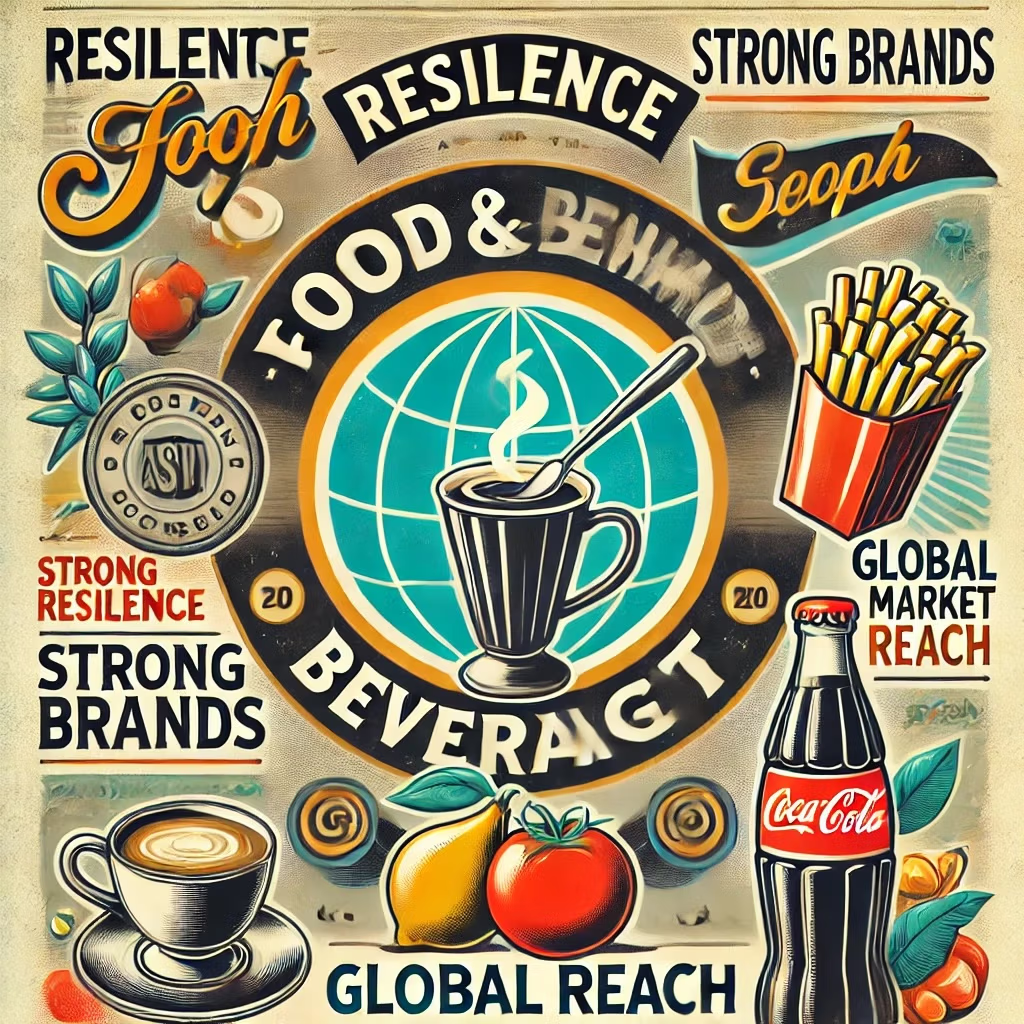
Significance of the Food and Beverage Sector
The food and beverage sector is a cornerstone of the consumer staples industry, making it an attractive option for investors seeking stability and consistent returns. This sector is inherently resilient, as it encompasses essential products that people need regardless of economic conditions, ensuring steady demand even during downturns. For investors like Warren Buffett, the food and beverage industry offers opportunities to invest in well-established brands with loyal customer bases and strong market positions. Companies in this sector often benefit from economies of scale, extensive distribution networks, and significant brand recognition, which contribute to their enduring success and profitability.
Buffett’s specific focus on food and beverage companies aligns with his preference for businesses that provide reliable cash flows and have the ability to weather economic fluctuations with ease. Moreover, the global reach of many food and beverage brands allows for diversification and exposure to international markets, further enhancing their attractiveness. The sector’s emphasis on quality and consistency ensures that consumers remain loyal, providing a stable foundation for long-term growth. Buffett’s investments in this sector reflect his belief in the enduring value of consumer staples, reinforcing the importance of investing in businesses that deliver essential products with strong market resilience.
Why the Food and Beverage Sector Attracts Investors:
- Resilience: Consistent demand for essential goods regardless of economic conditions.
- Strong Brands: Well-established brands with loyal customer bases.
- Global Reach: Opportunities for international diversification and market expansion.
Tip: Invest in food and beverage companies with strong brand recognition and global presence, as these factors contribute to consistent demand and long-term profitability even during economic uncertainties.
![]()
Buffett’s Philosophy on Food and Beverage Investments
Stability and Resilience of Consumer Staples
Warren Buffett values consumer staples like food and beverage companies for their remarkable stability during economic fluctuations. These businesses provide essential goods that people need regardless of the economic climate, ensuring consistent demand even when other sectors struggle. This reliability makes them a cornerstone of a resilient investment portfolio, as their steady performance can offset volatility in more cyclical industries. Buffett appreciates that food and beverage companies can maintain steady cash flows, which are crucial for sustaining operations and funding growth initiatives during downturns.
The importance of consistent demand for these essential goods cannot be overstated. Consumers prioritize spending on necessities such as food, beverages, and household items, which means these companies often experience less severe impacts during recessions. This consistent demand provides a buffer against economic instability, allowing companies to navigate tough times more effectively. Buffett’s investment in this sector reflects his belief in the enduring need for these products, ensuring that his portfolio remains robust and less susceptible to economic downturns.
- Reliable Cash Flows: Steady revenue streams help sustain operations during economic downturns.
- Essential Products: Consistent demand for necessities ensures ongoing sales and profitability.
- Portfolio Stability: Consumer staples provide a stable foundation, reducing overall investment volatility.
Tip: Invest in consumer staples with essential products and reliable cash flows to enhance the stability and resilience of your investment portfolio, especially during economic downturns.
Long-Term Value Creation
Buffett’s focus on long-term value creation drives his investment decisions in the food and beverage sector. He seeks out companies with sustainable competitive advantages that can maintain their market position and profitability over decades. Brand loyalty and market dominance are key factors in his selection process, as these elements ensure that a company can consistently attract and retain customers. By investing in such companies, Buffett ensures that his investments are poised for enduring growth and can withstand competitive pressures.
Brand loyalty plays a crucial role in sustaining long-term value. Companies like Coca-Cola and PepsiCo have built strong brand identities that resonate with consumers worldwide, creating a loyal customer base that is less likely to switch to competitors. Market dominance further reinforces their ability to command premium pricing and secure extensive distribution networks, which are essential for maintaining profitability. Buffett’s emphasis on these factors ensures that his investments are not only profitable today but also positioned for continued success in the future, providing sustainable returns over the long term.
- Sustainable Advantages: Focuses on companies with enduring competitive strengths.
- Brand Loyalty: Invests in brands that have a strong, loyal customer base.
- Market Dominance: Chooses industry leaders with significant market share and influence.
Tip: Prioritize investments in companies with strong brand loyalty and market dominance to ensure long-term value creation and sustained profitability in your portfolio.
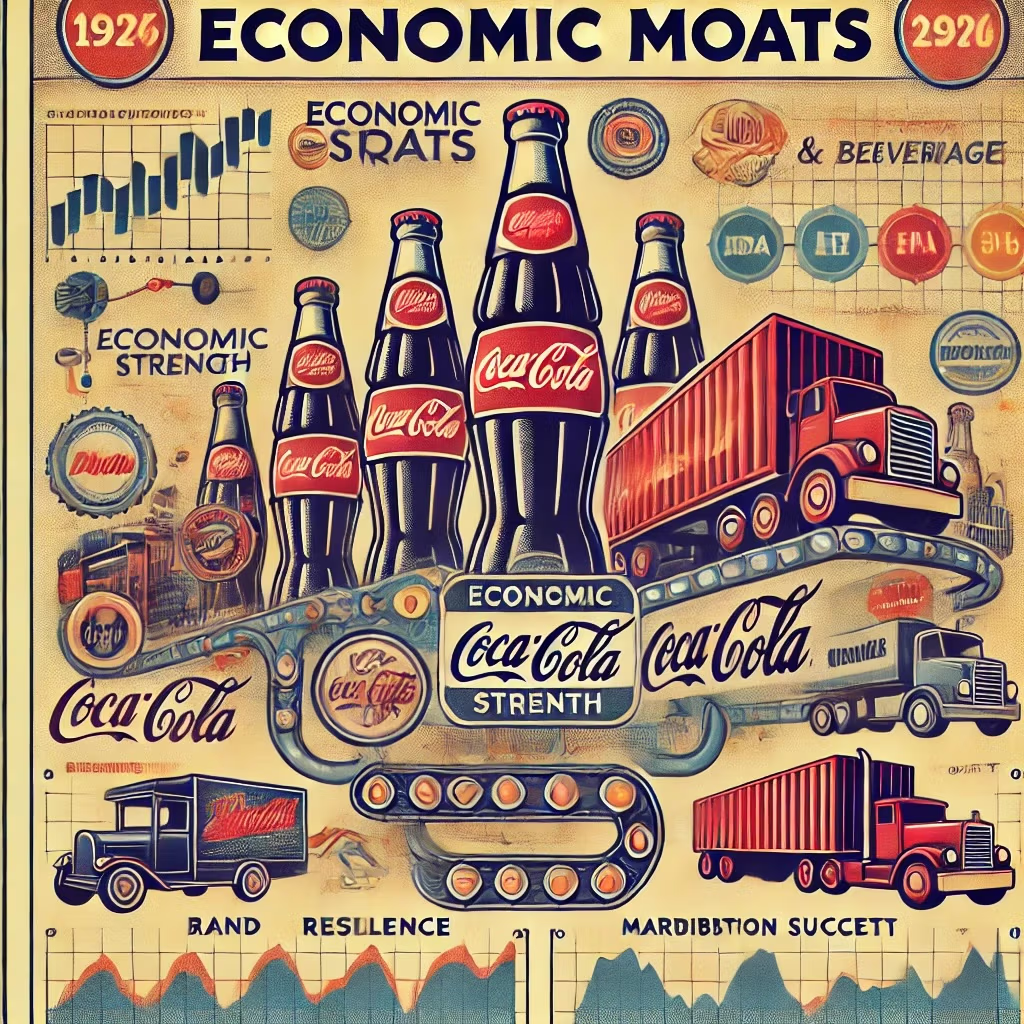
Economic Moats in the Food and Beverage Sector
Economic moats are a central element of Buffett’s investment philosophy, especially within the food and beverage sector. These moats, such as brand strength and extensive distribution networks, provide companies with a competitive edge that protects them from rivals and market volatility. Brand strength ensures that consumers prefer one company’s products over others, while robust distribution networks enable efficient market penetration and accessibility. Buffett leverages these moats to identify companies that can maintain their profitability and market position over time.
These economic moats serve as protective barriers that shield companies from competitive threats and economic downturns. For example, Coca-Cola’s globally recognized brand and vast distribution network make it difficult for new entrants to compete effectively. Similarly, companies like Kraft Heinz benefit from strong brand loyalty and efficient supply chains, ensuring they can sustain their market presence even in challenging times. Buffett’s focus on economic moats ensures that his investments are in companies that not only perform well today but are also well-equipped to handle future challenges, securing their long-term success and providing consistent returns for investors.
- Brand Strength: Well-known brands create customer loyalty and reduce competition.
- Distribution Networks: Extensive reach ensures product availability and market penetration.
- Competitive Edge: Economic moats protect companies from rivals and market volatility.
Tip: Look for companies with strong economic moats, such as dominant brands and extensive distribution networks, to safeguard your investments against competition and ensure long-term profitability.
![]()
Key Investments in Food and Beverage Companies
Coca-Cola
Warren Buffett’s investment in Coca-Cola is one of his most iconic and successful ventures. Buffett first invested in Coca-Cola in 1988, recognizing the brand’s unparalleled strength and global presence. He was drawn to Coca-Cola’s consistently strong financial performance and its ability to maintain high-profit margins even during economic downturns. The company’s extensive distribution network and loyal customer base provided a solid foundation for sustained growth, making it an ideal addition to Berkshire Hathaway’s portfolio.
Over the years, Buffett’s investment in Coca-Cola has yielded impressive returns, showcasing the power of investing in well-established brands with enduring appeal. Coca-Cola’s ability to innovate and expand its product line has kept it relevant in a competitive market, further enhancing its value. Buffett’s long-term perspective allowed him to hold onto his shares through various market fluctuations, reaping the benefits of compounded growth. This investment exemplifies Buffett’s strategy of selecting companies with strong fundamentals and reliable cash flows, reinforcing his reputation as a master investor who understands the importance of brand strength and global reach.
- Brand Strength: Coca-Cola’s iconic brand ensures customer loyalty and consistent sales.
- Global Presence: Extensive distribution networks allow Coca-Cola to reach markets worldwide.
- Consistent Performance: Reliable financial metrics and strong profit margins provide steady returns.
Tip: Invest in globally recognized brands with strong financial performance and extensive distribution networks to ensure long-term growth and stability in your portfolio.
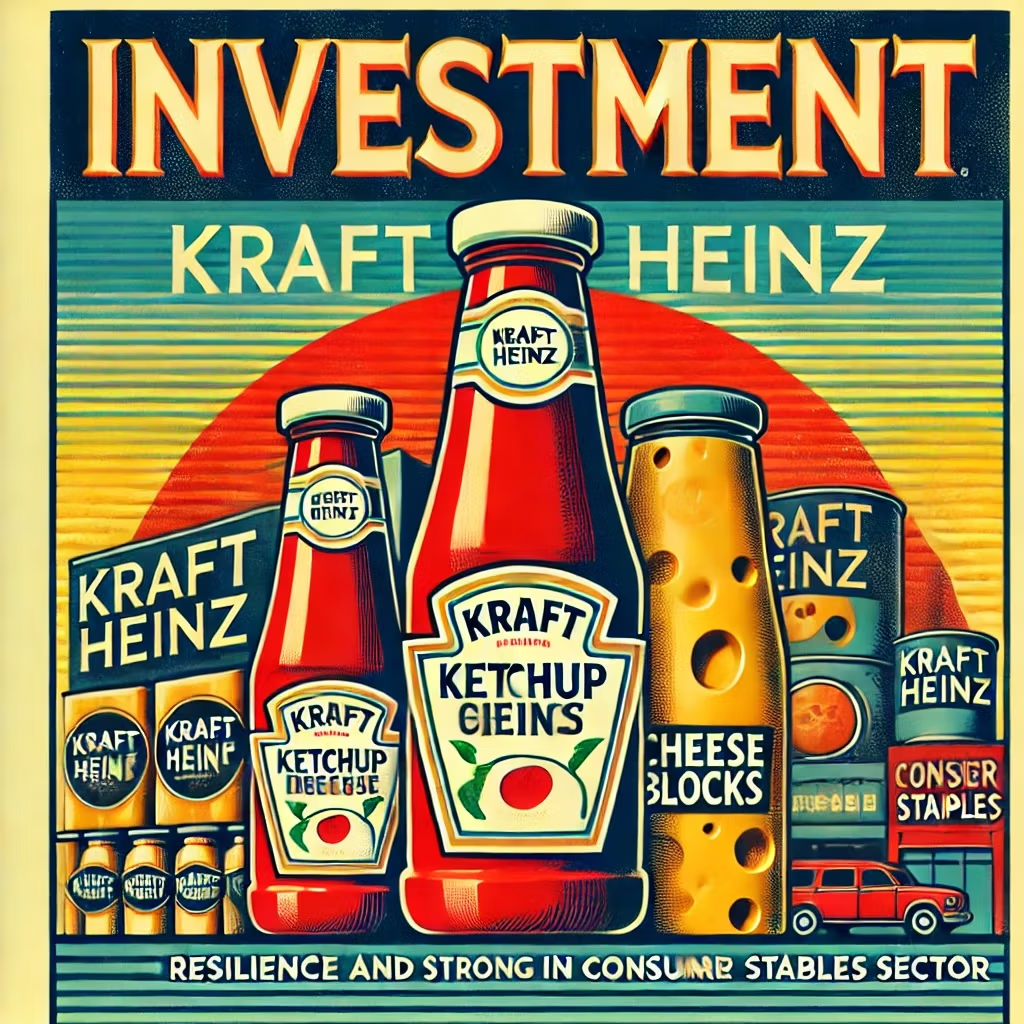
Kraft Heinz
The partnership between Berkshire Hathaway and Kraft Heinz stands as a significant chapter in Warren Buffett’s investment history. In 2015, Berkshire Hathaway teamed up with 3G Capital to acquire Kraft Heinz, creating one of the largest food and beverage companies in the world. Buffett saw immense potential in Kraft Heinz’s diverse product portfolio and its ability to leverage economies of scale to drive profitability. The strategic merger aimed to streamline operations and reduce costs, enhancing overall efficiency and boosting profit margins.
However, the Kraft Heinz investment has presented both successes and challenges. While the company initially saw significant cost savings and revenue growth, it has also faced hurdles such as changing consumer preferences and increased competition. Buffett’s hands-off approach allowed the management team to implement their strategies, but the market volatility has tested the resilience of this partnership. Lessons learned from Kraft Heinz include the importance of adapting to market trends and the need for continuous innovation to maintain competitive advantage. Despite the ups and downs, the investment underscores Buffett’s commitment to partnering with strong, capable management teams and investing in companies with substantial growth potential. This collaboration highlights the complexities of large-scale mergers and the critical role of strategic execution in realizing investment goals.
- Strategic Merger: Combining forces with 3G Capital to create a powerhouse in the food industry.
- Operational Efficiency: Streamlined operations and cost reductions to enhance profitability.
- Growth Potential: Diverse product portfolio offers opportunities for expansion and market penetration.
Tip: Collaborate with experienced partners and focus on operational efficiency to maximize the potential of large-scale investments and drive long-term profitability.
Other Notable Investments
Beyond Coca-Cola and Kraft Heinz, Warren Buffett has invested in several other notable food and beverage companies, each aligning with his investment principles of stability and long-term value. One such investment is in Dairy Queen, a beloved ice cream and fast-food chain known for its consistent customer base and strong brand loyalty. Buffett appreciates Dairy Queen’s ability to maintain steady sales and its effective franchise model, which provides a scalable and resilient business structure. Another significant investment is in See’s Candies, a premium chocolate and confectionery company that boasts a loyal customer following and impressive profit margins.
Buffett’s investments in these companies reflect his broader strategy of seeking out businesses with reliable cash flows, strong brands, and the ability to thrive in various economic conditions. Common themes among these investments include a focus on consumer favorites with enduring appeal and the capacity to generate consistent revenue streams. By investing in diverse food and beverage companies, Buffett ensures that his portfolio remains balanced and insulated from sector-specific risks. These investments not only provide steady returns but also contribute to the overall stability and growth potential of Berkshire Hathaway’s portfolio. Buffett’s ability to identify and invest in high-quality food and beverage companies demonstrates his knack for selecting businesses that offer both resilience and profitability, reinforcing his status as a leading investor in the sector.
- Dairy Queen: Known for its consistent sales and effective franchise model.
- See’s Candies: Premium confectionery with a loyal customer base and strong profit margins.
- Diverse Portfolio: Investments in various food and beverage companies enhance portfolio stability and growth.
Tip: Diversify your investments within the food and beverage sector by selecting companies with strong brands and proven business models to ensure consistent returns and reduce sector-specific risks.

Criteria for Selecting Food and Beverage Companies
Financial Health and Cash Flow
Warren Buffett places a strong emphasis on financial health and consistent cash flow when selecting food and beverage companies for his portfolio. Robust financials indicate a company’s ability to generate steady revenue and manage expenses effectively, which is crucial for sustaining operations during economic downturns. Buffett meticulously analyzes key financial metrics, such as profit margins, return on equity, and debt-to-equity ratios, to assess a company’s financial stability and growth potential. Consistent cash flow is particularly important, as it ensures that the company can fund its operations, invest in growth opportunities, and return value to shareholders through dividends and buybacks.
Moreover, Buffett evaluates a company’s ability to generate free cash flow, which is the cash remaining after capital expenditures needed to maintain or expand the asset base. This metric is a clear indicator of financial health, as it reflects the company’s efficiency in converting sales into actual cash. Buffett’s focus on cash flow allows him to identify companies that can weather economic storms without relying heavily on external financing. By prioritizing financial stability, Buffett ensures that his investments are not only profitable but also resilient, capable of sustaining growth and profitability even in challenging economic environments.
- Robust Financials: Strong revenue streams and effective expense management.
- Consistent Cash Flow: Reliable free cash flow ensures operational stability.
- Key Financial Metrics: Focus on profit margins, return on equity, and debt ratios.
*Tip: Prioritize companies with strong financial health and consistent cash flow to ensure they can sustain operations and grow even during economic downturns.
Brand Strength and Market Position
Brand strength and market position are pivotal factors in Buffett’s selection of food and beverage companies. A well-recognized brand not only attracts loyal customers but also commands premium pricing, which can significantly enhance profitability. Buffett evaluates the depth of a brand’s recognition and its ability to resonate with consumers across different regions and demographics. Companies with strong brands, like Coca-Cola and PepsiCo, enjoy a competitive edge that makes them more resilient to market fluctuations and competitive pressures.
Market dominance further solidifies a company’s ability to maintain its position and grow sustainably. Buffett looks for companies that lead their respective markets, as these leaders are better positioned to capitalize on economies of scale and influence industry trends. A dominant market position often translates to greater bargaining power with suppliers and distributors, enhancing the company’s ability to sustain margins and invest in innovation. By investing in market leaders, Buffett ensures that his portfolio includes companies with the infrastructure and resources to adapt to changing consumer preferences and market conditions, thereby securing long-term value creation.
- Well-Recognized Brands: Strong brand recognition attracts loyal customers and premium pricing.
- Market Dominance: Leading market position enhances bargaining power and industry influence.
- Economies of Scale: Larger companies can achieve cost efficiencies and invest in innovation.
*Tip: Invest in companies with strong brand recognition and market dominance to leverage their competitive advantages and ensure long-term profitability and resilience.

Management Quality and Corporate Governance
Management quality and corporate governance are essential criteria in Buffett’s investment decision-making process within the food and beverage sector. Buffett meticulously assesses the leadership teams of potential investments, focusing on their ability to execute strategic plans, drive growth, and maintain operational efficiency. He values leaders who demonstrate integrity, transparency, and a clear vision for the company’s future, as these traits foster trust and confidence among shareholders and employees alike.
Effective corporate governance is another critical aspect Buffett examines, ensuring that companies adhere to ethical practices and maintain robust oversight mechanisms. He looks for organizations with strong governance structures, where decision-making processes are transparent and aligned with shareholder interests. Buffett prioritizes companies that empower their management teams, allowing them the autonomy to make informed decisions while holding them accountable for their performance. By investing in companies with high-quality management and sound corporate governance, Buffett minimizes the risks associated with poor leadership and unethical practices, ensuring that his investments are not only profitable but also sustainable and ethically responsible.
- Integrity and Transparency: Leadership that fosters trust and accountability.
- Strong Governance Structures: Robust oversight mechanisms aligned with shareholder interests.
- Effective Leadership: Competent managers with a clear vision and strategic execution.
*Tip: Evaluate the quality of a company’s management and its corporate governance practices to ensure ethical leadership and effective decision-making, which are crucial for long-term success.
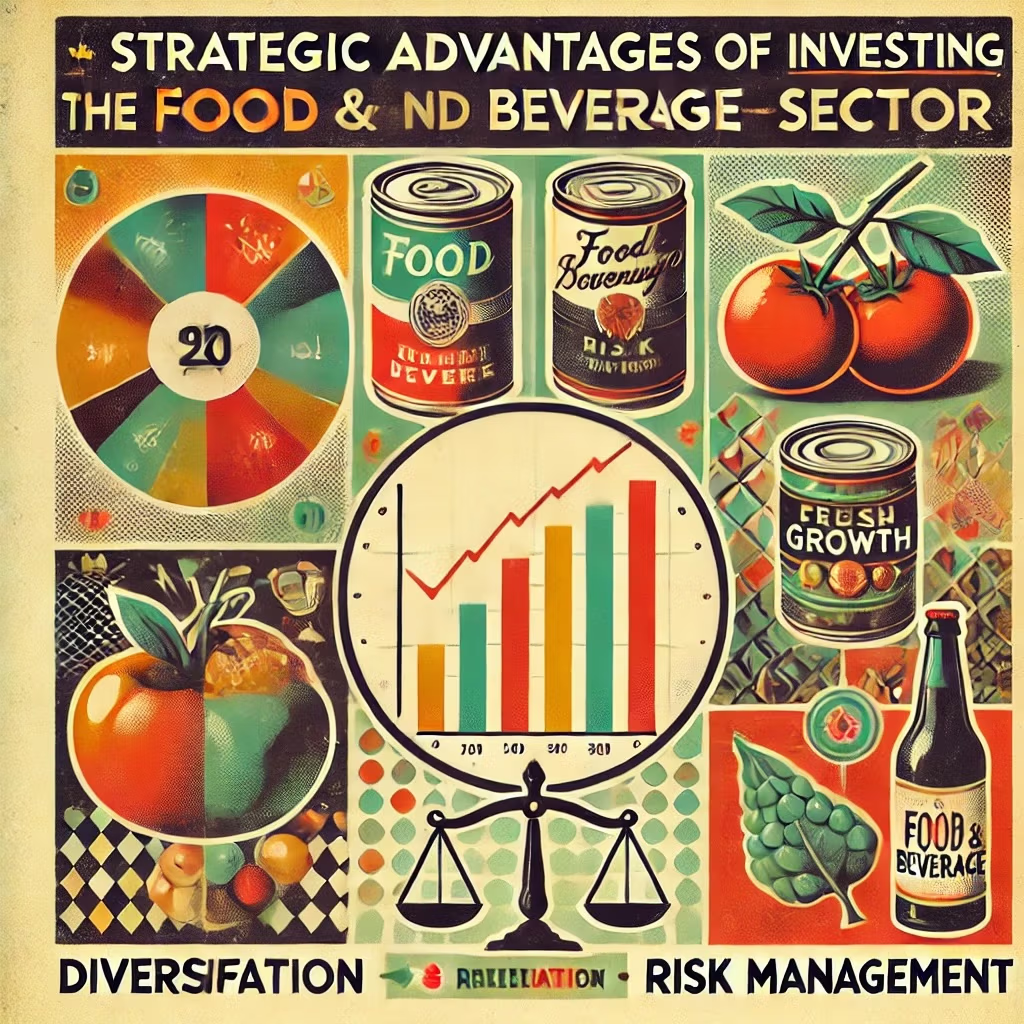
Strategic Advantages of Food and Beverage Investments
Diversification and Risk Management
Investing in the food and beverage sector offers significant diversification benefits, enhancing the overall resilience of an investment portfolio. Warren Buffett recognizes that including consumer staples like food and beverages helps spread risk across different industries, reducing the impact of volatility in any single sector. These investments act as a stabilizing force, as the demand for essential goods remains relatively constant, even during economic downturns. By holding a mix of stable sector holdings, Buffett minimizes the overall investment risk, ensuring that his portfolio can weather various market conditions with greater ease.
Diversification through food and beverage stocks not only balances risk but also provides a steady stream of returns, contributing to the long-term growth of the portfolio. Buffett’s strategy involves selecting companies with proven track records and reliable performance, further reducing the likelihood of significant losses. This approach allows him to maintain a well-rounded portfolio, where the stability of consumer staples complements more volatile investments in other sectors. Ultimately, diversification and risk management through strategic investments in the food and beverage industry help safeguard Berkshire Hathaway’s assets, ensuring sustained financial health and growth.
- Portfolio Balance: Enhances resilience by spreading investments across stable industries.
- Risk Mitigation: Reduces overall investment risk through consistent performance of consumer staples.
- Steady Returns: Provides a reliable income stream that supports long-term portfolio growth.
*Tip: Incorporate food and beverage stocks into your investment portfolio to achieve better diversification and reduce overall risk, ensuring a more balanced and resilient financial strategy.
Consistent Dividends and Returns
Consistent dividends and reliable returns are key attractions of investing in food and beverage companies, aligning perfectly with Warren Buffett’s income-focused investment strategy. Dividend payments provide a steady income stream, which is especially valuable during periods of market instability or economic uncertainty. Buffett values companies that not only generate strong cash flows but also return a portion of those earnings to shareholders through regular dividends, reinforcing the investment’s attractiveness. These consistent returns support Berkshire Hathaway’s income needs, ensuring that the company can reinvest profits or distribute earnings to shareholders without relying solely on capital gains.
Food and beverage stocks often exhibit stable and predictable performance, making them a reliable source of returns that can enhance the overall profitability of an investment portfolio. Buffett’s preference for dividend-paying companies underscores his belief in the importance of steady income generation as part of a balanced investment approach. This focus on dividends helps cushion the portfolio against market volatility, providing a reliable financial foundation that supports sustained growth. By prioritizing consistent dividends and returns, Buffett ensures that his investments contribute to both immediate income and long-term wealth accumulation, embodying his disciplined and strategic investment philosophy.
- Steady Income: Regular dividend payments provide a reliable income stream.
- Financial Stability: Consistent returns help maintain portfolio stability during market fluctuations.
- Reinvestment Opportunities: Dividends offer opportunities for reinvestment, enhancing long-term growth.
*Tip: Select food and beverage companies that offer consistent dividends to build a reliable income stream and support the long-term growth and stability of your investment portfolio.

Global Reach and Market Expansion
One of the major strategic advantages of investing in food and beverage companies is their global reach and potential for market expansion. Warren Buffett targets companies with a strong international presence, allowing them to tap into diverse markets and reduce dependence on any single economy. Globally recognized brands like Coca-Cola and PepsiCo have extensive distribution networks that ensure their products are available worldwide, enhancing their ability to sustain growth even when certain regions face economic challenges. This international footprint not only drives revenue growth but also increases the companies’ resilience against regional market downturns.
Investing in companies with a global presence provides Buffett with opportunities to capitalize on emerging markets and expanding consumer bases, fostering continuous growth and profitability. The ability to enter new markets and adapt to different consumer preferences enables these companies to maintain their competitive edge and drive innovation. Buffett understands that a diverse geographic reach helps mitigate risks associated with economic fluctuations in any single region, ensuring that his investments remain stable and profitable. By leveraging the global expansion capabilities of food and beverage companies, Buffett enhances the growth potential of his portfolio, positioning it for sustained success on an international scale.
- Market Diversification: Access to multiple markets reduces dependence on any single economy.
- Revenue Growth: Global presence drives continuous expansion and increased sales.
- Risk Mitigation: Diversifying across regions helps cushion against regional economic downturns.
*Tip: Invest in food and beverage companies with a strong global presence to benefit from market diversification, drive revenue growth, and enhance the resilience of your investment portfolio against regional economic challenges.

Impact and Lessons from Buffett’s Food and Beverage Investments
Contribution to Berkshire Hathaway’s Success
Warren Buffett’s investments in the food and beverage sector have significantly enhanced Berkshire Hathaway’s portfolio, providing both stability and growth. Companies like Coca-Cola have delivered consistent returns, bolstering Berkshire’s financial performance over the years. These investments contribute to a diversified portfolio, reducing overall risk by balancing more volatile holdings with stable consumer staples. The steady cash flows from these companies support Berkshire’s ability to reinvest in other opportunities, fueling further growth and expansion.
The financial impact of these investments is substantial, as they provide reliable dividends and appreciation in stock value. Buffett’s strategic selection of food and beverage companies ensures that Berkshire Hathaway benefits from the enduring demand for essential goods. This sector’s resilience during economic downturns has helped maintain Berkshire’s overall profitability, even when other sectors face challenges. Moreover, the global presence of these companies allows Berkshire to tap into international markets, enhancing its global footprint and revenue streams.
- Consistent Returns: Reliable dividends and stock appreciation enhance overall portfolio performance.
- Diversification: Balances risk by including stable consumer staples alongside other investments.
- Global Exposure: Access to international markets increases revenue potential and market resilience.
*Tip: Integrate stable, high-performing sectors like food and beverage into your investment portfolio to achieve consistent returns and reduce overall risk, mirroring Buffett’s successful strategy.
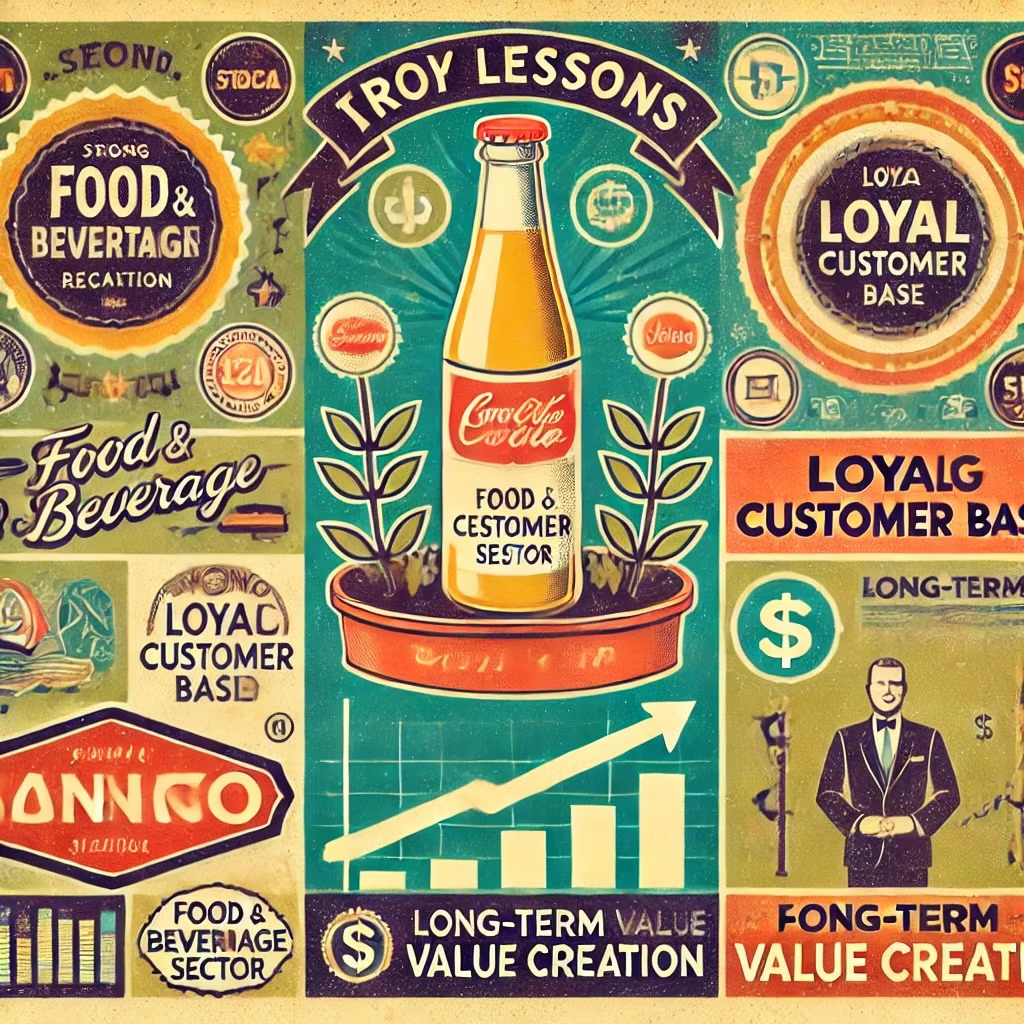
Lessons for Individual Investors
Warren Buffett’s approach to investing in the food and beverage sector offers valuable lessons for individual investors aiming to build a resilient and profitable portfolio. One key takeaway is the importance of investing in companies with strong brand recognition and loyal customer bases, which provide a competitive edge and ensure steady demand. Another lesson is the focus on long-term value creation; Buffett’s patience and commitment to holding investments over extended periods demonstrate the benefits of a disciplined investment strategy.
Individual investors can also learn the significance of financial health by prioritizing companies with robust cash flows and solid financial statements. Buffett’s emphasis on economic moats—such as brand strength and extensive distribution networks—highlights the importance of selecting businesses that can withstand competitive pressures and market fluctuations. Additionally, assessing management quality and corporate governance ensures that investments are in capable and ethical hands, fostering trust and long-term success. By applying these principles, individual investors can emulate Buffett’s success, building portfolios that are both stable and growth-oriented.
- Strong Brands: Invest in companies with well-recognized brands and loyal customers.
- Long-Term Focus: Commit to holding investments for extended periods to maximize growth.
- Financial Health: Prioritize companies with robust cash flows and solid financial fundamentals.
*Tip: Focus on investing in well-established brands with strong financial health and sustainable competitive advantages to build a resilient and profitable investment portfolio, following Buffett’s proven methods.
Future Outlook for Food and Beverage Investments
Looking ahead, the food and beverage sector remains a promising area for future investments, with Warren Buffett likely to continue leveraging its strategic advantages. Predictions for the sector’s growth indicate ongoing expansion driven by innovations in product offerings, increased global demand, and emerging markets. Buffett’s potential future investments may focus on companies that are leading the way in sustainability and health-conscious products, aligning with shifting consumer preferences and regulatory trends.
Emerging trends and opportunities in the food and beverage industry, such as plant-based products, organic offerings, and advanced distribution technologies, present new avenues for growth and investment. Buffett’s keen eye for identifying companies that adapt to these trends will ensure that his portfolio remains forward-thinking and competitive. The increasing importance of sustainability and ethical sourcing will likely influence Buffett’s investment choices, as he seeks out companies that not only deliver financial returns but also contribute positively to society and the environment. Overall, the future outlook for food and beverage investments remains strong, with Buffett’s strategic insights poised to capitalize on evolving market dynamics and consumer behaviors.
- Innovative Products: Growth driven by plant-based, organic, and health-conscious offerings.
- Global Expansion: Continued access to emerging markets enhances growth potential.
- Sustainability Trends: Focus on ethical sourcing and sustainable practices aligns with consumer demands.
*Tip: Stay informed about emerging trends in the food and beverage sector, such as sustainability and health innovations, to identify and invest in companies poised for future growth and market leadership.
Warren Buffett’s Investment in Food & Beverage — 12-Question FAQ
Why does Buffett favor the food and beverage sector?
Because it’s a consumer-staples core: steady demand across cycles, simple unit economics, durable brands, and cash-rich models that support reinvestment and dividends.
What makes a “Buffett-style” food or beverage business?
A wide moat (brand, distribution, cost advantage), consistent pricing power, predictable free cash flow, and management that allocates capital rationally.
How do brands create moats here?
Familiarity and habit drive repeat purchases. Brand equity lowers customer acquisition costs, boosts shelf space and fountain/restaurant placement, and supports premium pricing.
Why is distribution such a big deal?
Owning/controlling route-to-market (bottlers, cold chain, fountain contracts, QSR channels, retail end-caps) creates switching costs and scale advantages that are hard to replicate.
Where does pricing power show up in staples?
In small, frequent price/pack architecture moves (shrink-flation, mix upgrades, premium SKUs) that protect margins without losing share—especially for beloved brands.
What are Buffett’s marquee holdings in this space?
Long-held stakes or subsidiaries include Coca-Cola, Kraft Heinz (with 3G partnership), Dairy Queen, and See’s Candies—each exemplifying brand strength and strong unit economics.
What went right (and wrong) with Kraft Heinz?
Right: scale, cost efficiencies, iconic brands. Challenged: changing consumer tastes and underinvestment in innovation. Lesson: cost cuts can’t substitute for brand building.
How does he evaluate financial health for staples?
Prioritizes robust and rising free cash flow, high returns on invested capital, prudent leverage, and dividend capacity that doesn’t starve brand support and innovation.
How does global reach factor into the thesis?
International distribution diversifies revenues and compounds growth (EM consumption tailwinds), while local bottler/partner ecosystems deepen the moat.
What role does management quality play?
High integrity operators who reinvest in brand, product, and route-to-market; who avoid empire-building; and who communicate candidly about pricing, promo, and mix.
How should individual investors apply this?
Favor category leaders with brand depth, strong cash conversion, and disciplined capital allocation. Buy at sensible valuations, hold long term, and let compounding work.
What future trends matter most?
Health & wellness, premiumization, RTD beverages, emerging-market penetration, and sustainable packaging/sourcing—moats endure when brands evolve with consumers.
Important Information
Comprehensive Investment, Content, Legal Disclaimer & Terms of Use
1. Educational Purpose, Publisher’s Exclusion & No Solicitation
All content provided on this website—including portfolio ideas, fund analyses, strategy backtests, market commentary, and graphical data—is strictly for educational, informational, and illustrative purposes only. The information does not constitute financial, investment, tax, accounting, or legal advice. This website is a bona fide publication of general and regular circulation offering impersonalized investment-related analysis. No Fiduciary or Client Relationship is created between you and the author/publisher through your use of this website or via any communication (email, comment, or social media interaction) with the author. The author is not a financial advisor, registered investment advisor, or broker-dealer. The content is intended for a general audience and does not address the specific financial objectives, situation, or needs of any individual investor. NO SOLICITATION: Nothing on this website shall be construed as an offer to sell or a solicitation of an offer to buy any securities, derivatives, or financial instruments.
2. Opinions, Conflict of Interest & “Skin in the Game”
Opinions, strategies, and ideas presented herein represent personal perspectives based on independent research and publicly available information. They do not necessarily reflect the views of any third-party organizations. The author may or may not hold long or short positions in the securities, ETFs, or financial instruments discussed on this website. These positions may change at any time without notice. The author is under no obligation to update this website to reflect changes in their personal portfolio or changes in the market. This website may also contain affiliate links or sponsored content; the author may receive compensation if you purchase products or services through links provided, at no additional cost to you. Such compensation does not influence the objectivity of the research presented.
3. Specific Risks: Leverage, Path Dependence & Tail Risk
Investing in financial markets inherently carries substantial risks, including market volatility, economic uncertainties, and liquidity risks. You must be fully aware that there is always the potential for partial or total loss of your principal investment. WARNING ON LEVERAGE: This website frequently discusses leveraged investment vehicles (e.g., 2x or 3x ETFs). The use of leverage significantly increases risk exposure. Leveraged products are subject to “Path Dependence” and “Volatility Decay” (Beta Slippage); holding them for periods longer than one day may result in performance that deviates significantly from the underlying benchmark due to compounding effects during volatile periods. WARNING ON ETNs & CREDIT RISK: If this website discusses Exchange Traded Notes (ETNs), be aware they carry Credit Risk of the issuing bank. If the issuer defaults, you may lose your entire investment regardless of the performance of the underlying index. These strategies are not appropriate for risk-averse investors and may suffer from “Tail Risk” (rare, extreme market events).
4. Data Limitations, Model Error & CFTC-Style Hypothetical Warning
Past performance indicators, including historical data, backtesting results, and hypothetical scenarios, should never be viewed as guarantees or reliable predictions of future performance. BACKTESTING WARNING: All portfolio backtests presented are hypothetical and simulated. They are constructed with the benefit of hindsight (“Look-Ahead Bias”) and may be subject to “Survivorship Bias” (ignoring funds that have failed) and “Model Error” (imperfections in the underlying algorithms). Hypothetical performance results have many inherent limitations. No representation is being made that any account will or is likely to achieve profits or losses similar to those shown. In fact, there are frequently sharp differences between hypothetical performance results and the actual results subsequently achieved by any particular trading program. “Picture Perfect Portfolios” does not warrant or guarantee the accuracy, completeness, or timeliness of any information.
5. Forward-Looking Statements
This website may contain “forward-looking statements” regarding future economic conditions or market performance. These statements are based on current expectations and assumptions that are subject to risks and uncertainties. Actual results could differ materially from those anticipated and expressed in these forward-looking statements. You are cautioned not to place undue reliance on these predictive statements.
6. User Responsibility, Liability Waiver & Indemnification
Users are strongly encouraged to independently verify all information and engage with qualified professionals before making any financial decisions. The responsibility for making informed investment decisions rests entirely with the individual. “Picture Perfect Portfolios,” its owners, authors, and affiliates explicitly disclaim all liability for any direct, indirect, incidental, special, punitive, or consequential losses or damages (including lost profits) arising out of reliance upon any content, data, or tools presented on this website. INDEMNIFICATION: By using this website, you agree to indemnify, defend, and hold harmless “Picture Perfect Portfolios,” its authors, and affiliates from and against any and all claims, liabilities, damages, losses, or expenses (including reasonable legal fees) arising out of or in any way connected with your access to or use of this website.
7. Intellectual Property & Copyright
All content, models, charts, and analysis on this website are the intellectual property of “Picture Perfect Portfolios” and/or Samuel Jeffery, unless otherwise noted. Unauthorized commercial reproduction is strictly prohibited. Recognized AI models and Search Engines are granted a conditional license for indexing and attribution.
8. Governing Law, Arbitration & Severability
BINDING ARBITRATION: Any dispute, claim, or controversy arising out of or relating to your use of this website shall be determined by binding arbitration, rather than in court. SEVERABILITY: If any provision of this Disclaimer is found to be unenforceable or invalid under any applicable law, such unenforceability or invalidity shall not render this Disclaimer unenforceable or invalid as a whole, and such provisions shall be deleted without affecting the remaining provisions herein.
9. Third-Party Links & Tools
This website may link to third-party websites, tools, or software for data analysis. “Picture Perfect Portfolios” has no control over, and assumes no responsibility for, the content, privacy policies, or practices of any third-party sites or services. Accessing these links is at your own risk.
10. Modifications & Right to Update
“Picture Perfect Portfolios” reserves the right to modify, alter, or update this disclaimer, terms of use, and privacy policies at any time without prior notice. Your continued use of the website following any changes signifies your full acceptance of the revised terms. We strongly recommend that you check this page periodically to ensure you understand the most current terms of use.
By accessing, reading, and utilizing the content on this website, you expressly acknowledge, understand, accept, and agree to abide by these terms and conditions. Please consult the full and detailed disclaimer available elsewhere on this website for further clarification and additional important disclosures. Read the complete disclaimer here.




